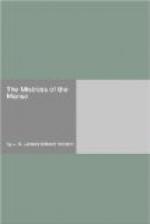And Mildred who, without a thought
Of glory in her week’s long task,
This marvel of the week had wrought,
Had earned the boon she would not ask,
And won more love than she had sought.
III.
As two who walk through forest aisles,
Lit all the way by forest flowers,
Divide at morn through twin defiles
To meet again in distant hours,
With plunder plucked from all the miles,
So Philip and his Mildred went
Into their walks of daily life,—
Parting at morn with sweet consent,
And—tireless husband, busy
wife—
Together when the day was spent,
Bringing the treasures they had won
From sundered tracks of enterprise,
To learn from each what each had done,
And prove each other grown more wise
Than when the morning was begun.
He strengthened her with manly thought
And learning, gathered from the great;
And she, whose quicker eye had caught
The treasures of the broad estate
Of common life and learning, brought
Her gleanings from the level field,
And gave them gladly to his hands,
Who had not dreamed that they could yield
Such sheaves, or hold within their bands
Such wealth of lovely flowers concealed.
His grave discourse, his judgment sure,
Gave tone and temper to her soul,
While her swift thoughts and vision pure,
And mirth that would not brook control,
And wit that kept him insecure
Within his dignified repose,
Refreshed and quickened him like wine.
No tender word or dainty gloze
Could give him pleasure half so fine
As that which tingled to her blows.
He gave her food for heart and mind,
And raised her toward his higher plane;
She showed him that his eyes were blind;
She proved his lofty wisdom vain,
And held him humbly with his kind.
IV.
Oh blessed sleep! in which exempt
From our tired selves long hours we lie,
Our vapid worthlessness undreamt,
And our poor spirits saved thereby
From perishing of self-contempt!
We weary of our petty aims;
We sicken with our selfish deeds;
We shrink and shrivel, in the flames
That low desire ignites and feeds,
And grudge the debt that duty claims.
Oh sweet forgetfulness of sleep!
Oh bliss, to drop the pride of dress,
And all the shams o’er which we
weep,
And, toward our native nothingness,
To drop ten thousand fathoms deep!
At morning only—strong, erect—
We face our mirrors not ashamed;
For then alone we meet unflecked
The image we at evening blamed,
And find refreshed our self-respect.
Ah! little wonderment that those,
Who see us most and love us best,
Find that a true affection grows
The more when, in its parted nest,
It spends long hours in lone repose!




